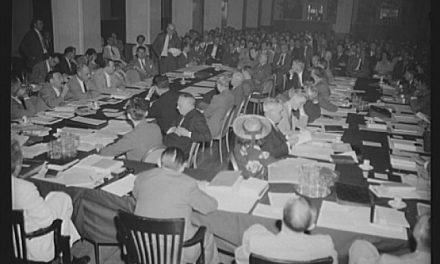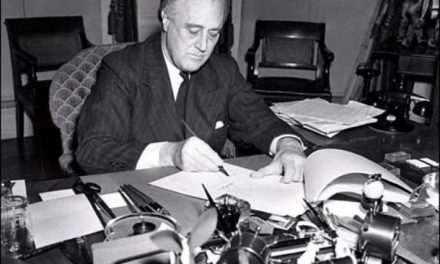The sounds of war production will ring out a few hours longer each week, thanks to a new executive order mandating a 48-hour work week from President Franklin D. Roosevelt.
The order, which is in effect until further notice, will apply to 32 “labor shortage” areas that Roosevelt listed. In those areas, the 48-hour week will apply to all employment, including retail stores, newspapers, and domestic servants.
While the executive order lists only 32 labor shortage areas, the War Manpower Commission expects there to be a total of 102 areas with labor shortages.
According to Deputy Commissioner of the War Manpower Commission Fowler Harper, employers must enforce this 48-hour work week.
“It will be mandatory, rather than be merely a statement of policy which they may follow or disregard,” Harper said of the companies that will be affected by the order. With the number of men being drafted, those on the home front are being asked to do even more.
“Those establishments in which the minimum work week is less than 48 hours are to stop recruiting [labor] at once unless they can go to a 48-hour work week without the need to release workers,” said Commissioner Paul McNutt.
In other words, the businesses and organizations which do not fall under the umbrella of the war industry are prevented from hiring new workers to allow for more workers to be available to aid in efforts to produce more help for the military on both fronts.
Employers can breathe a sigh of relief for the time being, though. While the executive order for the extended work week will go into effect immediately, it will not be enforced or required until after March 31. This will give employers a little over a month to get their ducks in a row to be able to handle the extra burdens that will come with the extra eight hours of work each week.

Working on the hull of an American submarine at Electric Boat Co. in Groton, Conn. (From National Archives)
Most workers will receive time-and-a-half wages for the additional eight hours they will be required to work. The areas in which employers will not be required to pay the extra cash to employees are the retail clerks, farm workers and domestic servants. These workers, though affected by the burden of an extra eight hours, will be required to negotiate for extra pay. They fall far enough within the war industry to have a necessary 48-hour work week, but not far enough to qualify for the mandatory overtime pay.
How can the Commission do this? Simple. Employers are protected from having to pay employees in non-union professions time-and-a-half thanks to the Forty-hour Act and other federal laws. To put it simply, “the overtime rates beyond 40 hours would apply as provided under union contracts,” according to the Commission.
As with any bill or executive order, there are winners and losers. And the biggest losers in this case may be consumers. Thanks to the spike in wages that will accompany the bill, there are fears that there will also be a spike in prices at stores, according to Eric Johnston, president of the United States Chamber of Commerce.
“Some business and labor leaders fear the new work policy will have a tendency to cause more inflation,” Johnston said. “Next to winning the war, the question that worries people the most is inflation because it destroys values and hurts everyone.”
Because of this, Johnson went on to say, in order to avoid a dangerous trend of rising prices, all prices will have to be controlled as much as possible.
Sources:
“New 48 Hr. Week Policy Arouses Inflation Fears.” The Chicago Tribune, Feb 12, 1943. Pg. 15.
Special to The New York Times. “Union Week Limit Goes By The Board.” The New York Times, Feb 12, 1943. Pg. 14.
The Associated Press. “48-Hr. Work Areas Limited At First.” The New York Times, Feb 10, 1943. Pg. 1.





